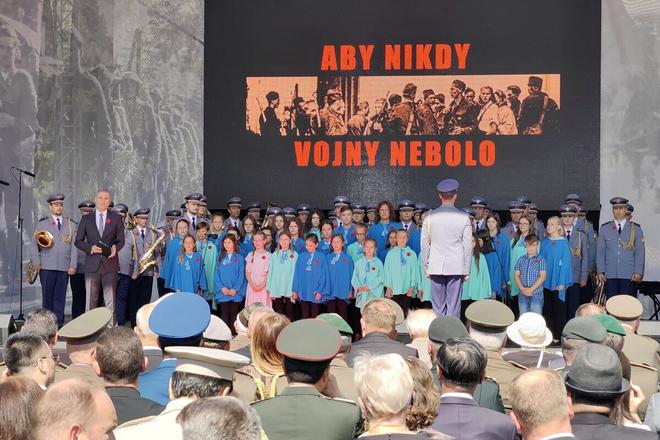Authoritarian regimes have the ambition of returning in new, reincarnated forms, and pose a threat to us today, President Zuzana Čaputová said during the celebrations of the Slovak National Uprising, the anti-fascist resistance movement that started in August 1944. The festivities take place every year in Banská Bystrica, the centre of the uprising.
"Today, like decades ago, there is the threat of brute force to subjugate nations, countries and people," the president said as quoted by the TASR newswire.
This year, the war in neighbouring Ukraine resonates in the commemoration of the Slovak National Uprising (SNP).
"Like the SNP participants who did not want to live in the world the Nazis were building, we do not want to live in a world the Russian president is striving for," PM Eduard Heger (OLaNO) said during the official part of the commemoration, as quoted by TASR.
Like every year, the festivities in Bystrica are attended by the diplomats active in Slovakia. Foreign nationals fought alongside Slovak partisans in resistance battles.
Anti-fascist resistance
The SNP, which began on August 29, 1944, was fairly quickly extinguished by the Nazi German army occupying Slovakia. But it was to play an important role in shaping the post-war settlement and Slovaks’ sense of identity both within and beyond their country. By rising against the Nazi-allied Bratislava government and joining the fight against Nazi Germany, the rebels earned Slovaks a place among the ranks of the victors in 1945.
"If it wasn't for the SNP, World War II would have been a national shame for us," PM Heger said.
President Čaputová stressed that the SNP anniversary is an opportunity to remember the struggle of regaining lost freedom. "It's our duty to do everything possible so we don't have to go through it again," she said as quoted by TASR.
Society's immunity against radical and extremist ideologies is weakened by the failures of democratically elected representatives. "It's also weakened when some try to convince us that they are the only bearers of the SNP legacy, shaking hands with present-day fascists," she said.
Smer invited Russian ambassador
The opposition party Smer of former prime minister Robert Fico criticised the ruling politicians for excluding the public from the official part of the SNP commemoration festivities.
In turn, he harvested criticism for inviting Russian and Belarussian diplomats to the Smer-organised event in Bystrica's neighbouring city, Zvolen.
Foreign Minister Ivan Korčok (SaS) reacted by saying that Smer is applauding the official representative of a state bringing aggression to Slovakia's neighbour.
"I condemn the decision of the Smer party to invite the ambassador of the Russian Federation to its political gathering masked as SNP celebrations today, while applauding his speech," the minister wrote on his Facebook page, calling it "outrageous."
"Smer now definitively and officially, not just verbally, is standing on the side of the aggressor and supports it in the war against Ukraine," wrote Korčok. He added that the Russian ambassador will receive an official protest tomorrow for publicly supporting a party openly cooperating with extremists who never distanced themselves from the Holocaust. This is a reference to the cooperation between the Smer and Republika party on the referendum for early elections.
Korčok maintained that these actions of the Russian diplomat are against the fundamental principles of non-interference into Slovakia's internal politics.



 SNP commemoration in Banska Bystrica on August 29, 2022. (source: SITA)
SNP commemoration in Banska Bystrica on August 29, 2022. (source: SITA)